Feed Mill in Bangladesh
Bangladesh is a densely populated nation with 182 million inhabitants and an annual growth rate of 1.1%. The natives face a formidable challenge in satisfying the nutritional needs of such a large population with organic food sources.
In the past ten years, dairy, livestock, poultry, and fish farming on both a commercial and household scale have increased to meet the rising demand. According to a report published by Financial Express on 13 February 2018, fish production increased by nearly 40%, meat production by 600%, and egg production by 200% in the fiscal year (FY) 2016-17.
During the same time period, milk production rose by 300 percent. In 2016-2017, the domestic protein demand for Meat and Fish was completely met due to the increase in local supply from commercial producers. However, there is a significant production gap between Milk and Eggs. Additionally, as a result of continuous population growth, the expansion of dairy, livestock, poultry, and fish agriculture to meet future demand increases is inevitable.
The prospect of Feed Mill Industry in Bangladesh
The poultry industry alone is expanding at a rate of approximately 20 percent per year. Bangladesh is not yet self-sufficient in the feed industry, which functions as a backward link for these rapidly expanding industries.
According to a recent report published by Global Agriculture Information Network, there is currently a demand-supply gap of 0.49 MMT annually in the Bangladesh Feed Industry, which has an annual capacity of approximately 5 MMT. In 2017 Bangladesh imported 0.4 million metric tons (MMT) of feed worth $155 million to supplement domestic supply. The annual domestic feed demand in Bangladesh is anticipated to increase to at least 9.5 MMT by 2020.
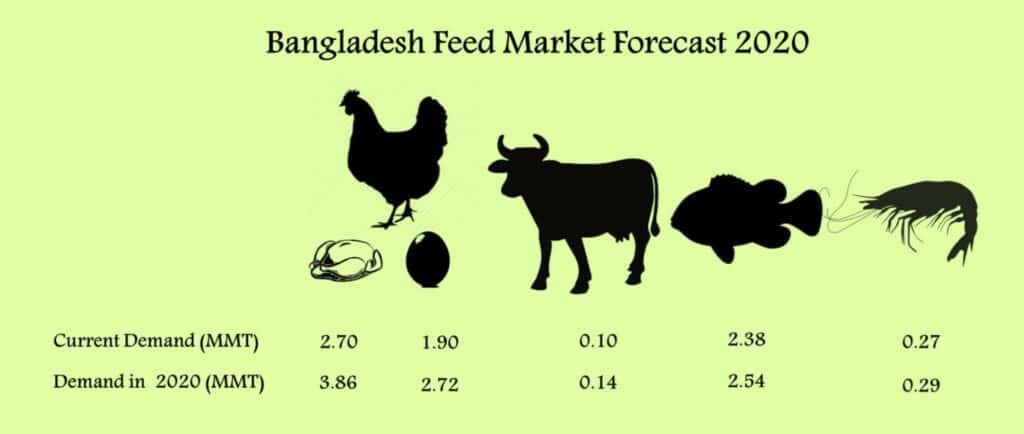
According to BBS (Bangladesh Bureau of Statistics), Bangladesh’s GDP grew by 7.86% in the 2017-18 fiscal year, significantly exceeding the predicted growth of 7.65%. And experts predict that rapid economic expansion will continue for the next several decades. Additionally, the per capita income increased to $1751 in FY 2017-18 from $1610 in FY 2016-17 [Dhaka Tribune, 18 September 2018].
As disposable income rises, so do expenditures on food products, particularly those rich in dietary protein, such as meat, egg, milk, and fish. According to studies, the effects of urbanization, the acceleration of economic growth trends in a country, and rural-urban migration fuel meat consumption.
In its most recent Household Income and Expenditure Survey (HIES) 2016 report, Bangladesh Bureau of Statistics (BBS) stated that daily per capita consumption of major meats such as chicken, duck, and beef as well as fish and egg has increased compared to 2010 . Among these protein sources, egg and chicken consumption has increased significantly.
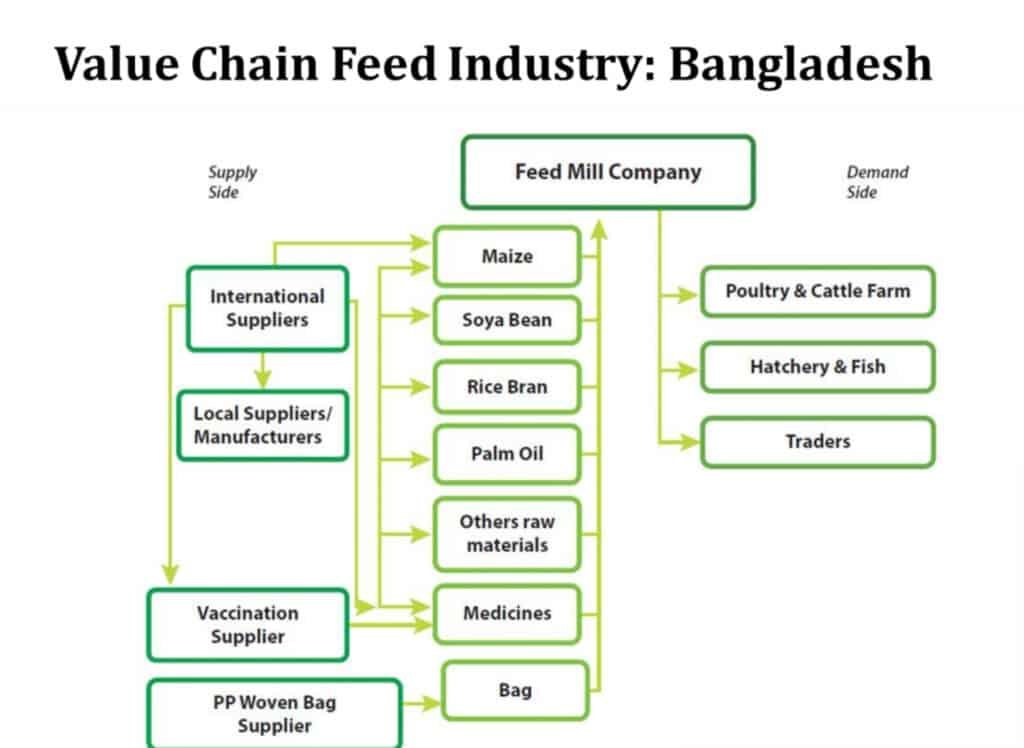
According to statistics, the average daily egg consumption increased to 13.58g in 2016 from only 7.20g in 2010. Similarly, chicken and duck consumption increased from 11.22g per day in 2010 to 17.33g per day in 2016. In addition, the 2016 HIES data revealed that beef consumption per capita increased to 7.54g in 2016 from 6.84g in 2010, while fish consumption increased to 62.58g from 49.50g in 2010.
All of this increased consumption has been met by the expansion of poultry, dairy, livestock, and fish farming, which has been supported by the expansion of the domestic feed industry.
Regression statistics comparing the historical production of livestock, poultry, and fish to the national GDP indicate that the expansion of this industry is strongly correlated with GDP expansion. The growth of livestock, poultry, and fish contributes around 98% [r2 98%] to the expansion of the economy.
Legal Steps on incorporating a Feed Mill Company in Bangladesh:
Bangladesh is one of the fastest-growing economies in South Asia, with a population of over 160 million people. The country’s agricultural sector is an essential part of the economy, contributing about 20% to the country’s Gross Domestic Product (GDP) and providing employment to around 47% of the country’s workforce. The feed mill industry is a crucial component of the agricultural sector in Bangladesh, providing essential nutrition to the country’s livestock. In this article, we will outline the steps involved in incorporating a feed mill industry in Bangladesh.
Step 1: Determine the Legal Structure of the Feed Mill Industry:
The first step in incorporating a feed mill industry in Bangladesh is to determine the legal structure of the company. The most common legal structures for companies in Bangladesh are sole proprietorship, partnership, and limited liability company (LLC). An LLC is the most preferred option for a feed mill industry because it provides limited liability protection to the company’s owners and shareholders.
Step 2: Reserve a Name for the Company:
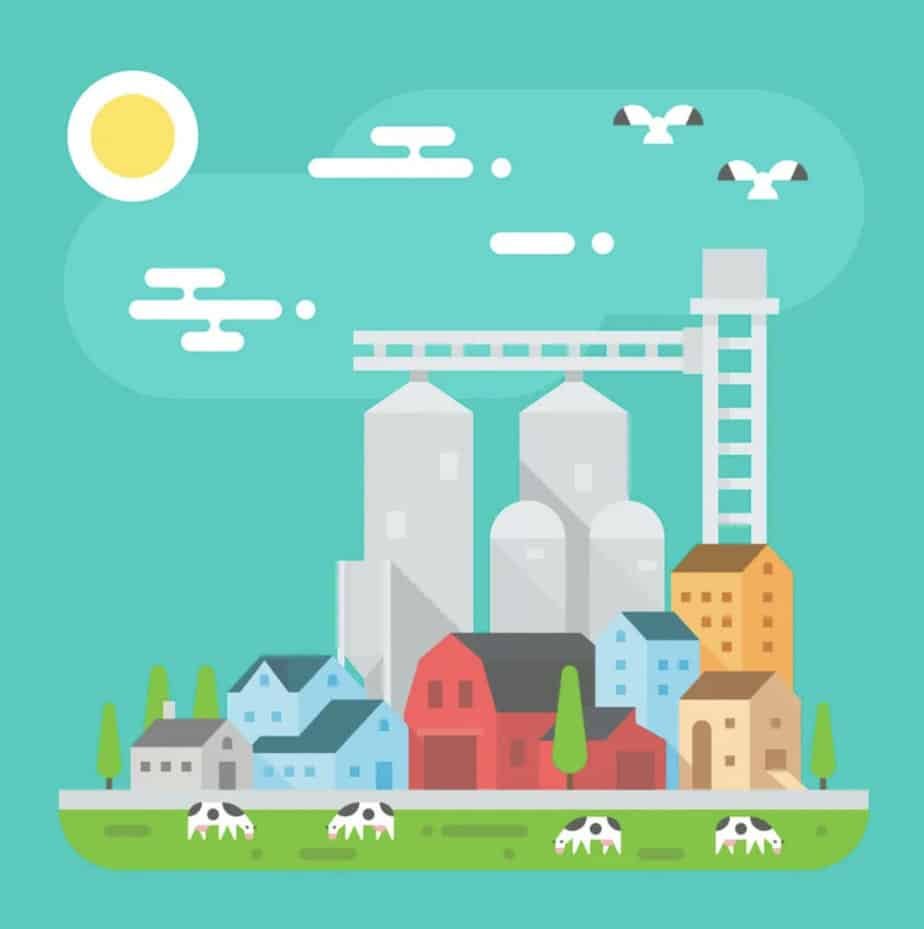
The next step is to reserve a name for the company. The proposed name should be unique and not be identical or similar to any existing company’s name in Bangladesh. The company’s name must also comply with the rules and regulations set by the Registrar of Joint Stock Companies and Firms (RJSC).
Step 3: Prepare the Memorandum and Articles of Association:
The Memorandum and Articles of Association (M&A) define the company’s objectives, structure, and rules of operation. The M&A should be prepared in compliance with the Companies Act 1994 of Bangladesh. The M&A must include the following information:
- The name and registered office of the company.
- The objectives of the company.
- The authorized share capital of the company.
- The number and types of shares issued by the company.
- The rules for the management and administration of the company.
- The rights, powers, and duties of the company’s directors and shareholders.
Step 4: Obtain the Necessary Permits and Licenses:
The feed mill industry is a regulated sector in Bangladesh, and obtaining the necessary permits and licenses is crucial before commencing operations. The following permits and licenses are required to operate a feed mill industry in Bangladesh:
- Trade License: A trade license is issued by the local municipal authority and is required to operate any business in Bangladesh.
- Environmental Clearance Certificate: An Environmental Clearance Certificate (ECC) is required from the Department of Environment (DoE) to ensure that the feed mill industry complies with the environmental laws and regulations of Bangladesh.
- Fire License: A Fire License is issued by the Bangladesh Fire Service and Civil Defense to ensure that the feed mill industry complies with the fire safety regulations of Bangladesh.
- Explosives License: An Explosives License is required to store and handle explosives, including blasting agents and detonators, that are used in the feed mill industry.
- Food License: A Food License is required from the Bangladesh Standards and Testing Institution (BSTI) to ensure that the feed produced by the feed mill industry is safe for consumption.
Step 5: Register with the RJSC:
The next step is to register the company with the RJSC. The following documents must be submitted to the RJSC for registration:
- The M&A of the company.
- A list of the company’s directors and shareholders.
- A declaration from the company’s directors and shareholders confirming that they are not disqualified from being directors or shareholders of a company under the Companies Act 1994.
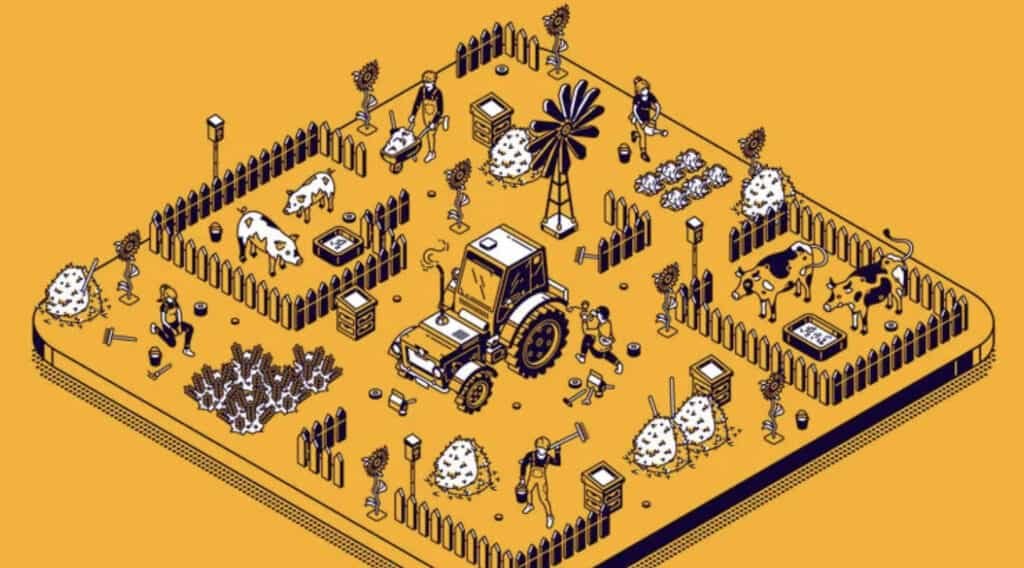
Step 6: Obtain Tax Identification Number and VAT Registration:
The company must obtain a Tax Identification Number (TIN) and Value Added Tax (VAT) registration from the National Board of Revenue (NBR). The Tax identification number is a unique 11-digit number issued by the NBR to identify the company for tax purposes. VAT registration is mandatory for businesses with an annual turnover of more than BDT 3 million. The company must register for VAT with the local VAT office within 15 days of starting operations.
Step 7: Open a Bank Account and Obtain a Trade License:
The next step is to open a bank account in the company’s name and obtain a trade license from the local municipal authority. The trade license is required to operate the feed mill industry in Bangladesh.
Step 8: Hire Employees and Obtain Insurance:
The company must hire employees to operate the feed mill industry. The employees must be registered with the social security authorities in Bangladesh, and the company must provide them with social security benefits. The company must also obtain insurance coverage for its employees, assets, and liabilities.
Incorporating a feed mill industry in Bangladesh requires compliance with various legal and regulatory requirements. The company must follow the steps outlined above to incorporate a feed mill industry in Bangladesh.
The process of incorporating a feed mill industry in Bangladesh may seem daunting, but it is essential to ensure that the company operates legally and ethically. By following the steps outlined above, the company can ensure compliance with the laws and regulations of Bangladesh and operate a successful feed mill industry.
Supply & Demand for Feed mills in Bangladesh:
The primary raw materials utilized by feed mills are corn and soybeans. Domestic production of these agri-grains falls short of satisfying domestic demand. According to Indexmundi, Bangladesh consumed 5,3 MMT of maize in 2018, of which approximately 70% was used for animal feed. 66% of the maize consumed in Bangladesh in 2018 was produced domestically, while approximately 2 MMT was imported from other countries.
However, the domestic production of maize/corn in Bangladesh has increased dramatically as a result of advanced technology and the introduction of summer maize in addition to the traditional winter harvest.
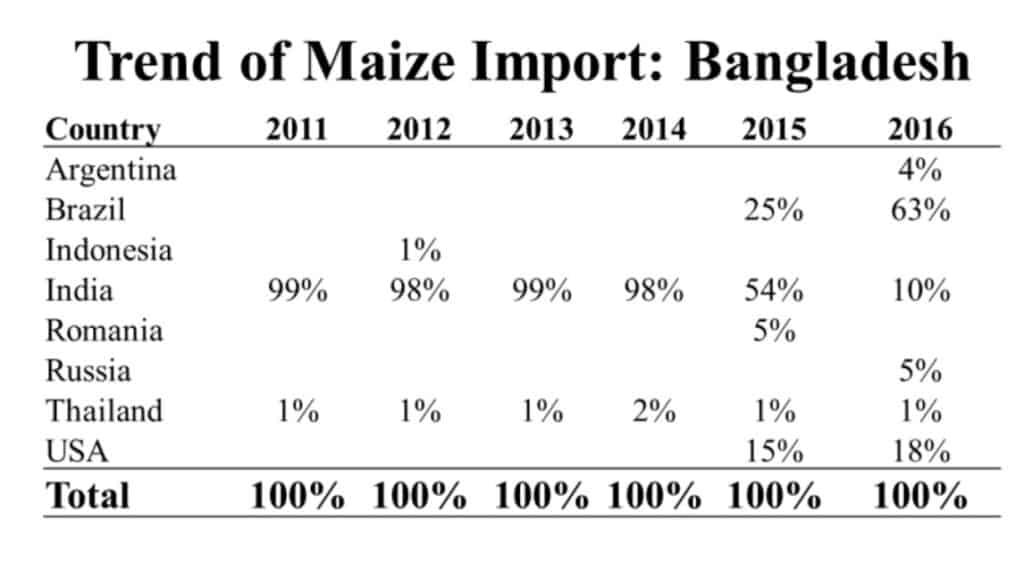
Prior to 2015, India was Bangladesh’s largest supplier of maize, but maize is now sourced from multiple countries, including Brazil, the United States, and Argentina, among others. Soybean is the second most important raw material, and its supply is also primarily met through imports. To produce animal and fish feed, Bangladesh annually consumes approximately 1.40 MMT of soybeans, of which 90% are imported.
Currently, the United States is Bangladesh’s largest import source for soybeans. In addition, millers import a variety of other raw materials for the production of feed, including premix (a mixture of vitamins and other feed additives), Meat and Bone Meal, oil, vitamins, and other additives. Overall, feed mills maintain three to four months’ worth of inventory at all times. Feed is distributed to commercial farmers through designated distributors.
The production procedure begins with the grinding of some inputs. However, there are some inputs that do not require grinding (such as oil, vitamins, and minerals), which are either premixed for later use or added to the production via the weighing/batching process during the subsequent step, mixing.
The outputs of feed vary according to the breeds of final consumers. Typically, feed manufacturers’ own R&D divisions develop formulas for various types of end consumers. The crushed ingredients are then combined with the remaining ingredients according to the proportions specified in specific formulas. The process of passing steam through the mixture to form pellets is known as pelleting.
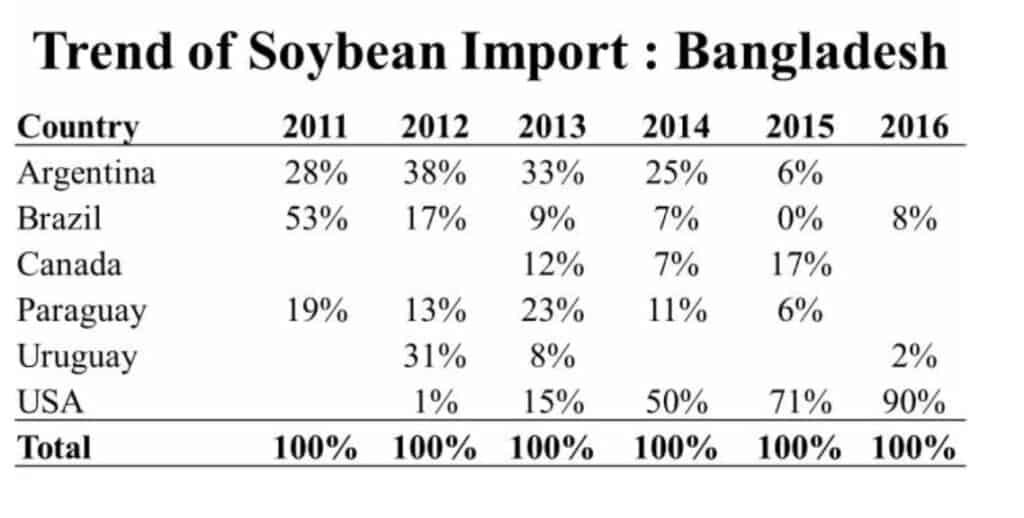
The mixture is subsequently cooled in a cooler. To maintain the quality of the feed and prevent the growth of fungi, the process uses sterile water to generate steam. Occasionally, enzymes and medications are added after pelleting according to the formula. The output is then packaged and/or stored in preparation for distribution.
Feed types in Bangladesh
Whereas multiple types of animal and fish feed are produced globally for various species such as cow, horse, dog, rat, broiler, layer, duck, etc., the feed industry in Bangladesh is dominated by three species: cattle, poultry (broiler and layer chicken), and fish.
There are two primary categories of poultry feed: Broiler and Layer.
The stages of a poultry’s production life cycle influence its feed ingredients, which are primarily divided into two stages: Starter and Grower.
The physical form of the feed is also crucial. The two fundamental physical forms of poultry feed are mash and pellets. Each mouthful of mash provides a well-balanced diet because the ingredients are finely ground and thoroughly combined. A mash diet provides greater growth unification, a lower mortality rate, and is more cost-effective.
However, ground feed is less palatable and retains its nutritional value less effectively than unground feed. The pellet system is an adaptation of the mash system. It involves mechanically pressing the mash into hard, dry pellets, also known as “artificial grains.” It is generally accepted that, compared to mash, the feeding of pellets improves broiler growth rate by increasing feed intake. However, feeding pelleted rations alone is not sufficient to ensure improved poultry performance.
Crumble is also a type of feed made at the mill by pelletizing the mixed ingredients and then crushing the pellet to a texture coarser than mash. This form of feed has recently gained popularity in broiler production due to its feeding convenience. Ideally, early-age chickens for both broiler and layer production should be fed mash. At the grower stage, whereas layers continue to consume Mash and Crumble, broiler chicken primarily consumes pellets.
As each species requires a unique diet, the Fish Feed Shelf is the most diverse of all the feed shelves. However, there are two major types of fish food: sinking and floating. Both Sinking and Floating feed are capable of producing satisfactory growth, but some species prefer floating and others prefer sinking. In general, however, floating pellets offer more benefits than sinking pellets.
The arrangement of adequate working capital is essential for the success of any manufacturing enterprise. In Bangladesh, the major players in the Feed Mill Industry have a large installed capacity relative to their current capacity utilization, allowing them to accommodate future market growth.
Large feed mills currently produce in response to market demand. Due to the lengthy raw materials procurement process from foreign sources and the need for a buffer stock to hedge against supply seasonality, the cash cycle is nearly four months. A benchmark for working capital needs for per-MT feed production Based on recent market trends, the following is-

These foreign investors are able to achieve economies of scale with ease thanks to low-cost credit from their parent companies and financial institutions in their home country, whereas local farms struggle with higher credit costs. According to a representative of the Bangladesh Poultry Industries Central Council (BPICC), the number of poultry farms decreased from approximately 150,000 in 2007 to approximately 70,000 in 2017.
It is essential for millers to achieve a competitive margin, which they can do with an investment-friendly customs tariff. GoB has aided feed millers by exempting nearly all customs duties for maize under HS Codes 10051010 and 10051090.
Still, millers are seeking a waiver of customs duties on a key ingredient, soybeans. By further amending the Jute Packaging Rules, the Government of Britain recently announced that producers of poultry and fish feeds will be required to package their products in jute bags.

Questions and answers about the process of opening a Feed Mill in Bangladesh
here’s a FAQ table with 10 questions and answers about the process of opening a Feed Mill in Bangladesh and some of the challenges that may arise:
| Question | Answer |
|---|---|
| What is the process of incorporating a Feed Mill industry in Bangladesh? | The process involves determining the legal structure of the company, reserving a name for the company, preparing the Memorandum and Articles of Association, obtaining necessary permits and licenses, registering with the Registrar of Joint Stock Companies and Firms, obtaining a Tax Identification Number and VAT registration, opening a bank account and obtaining a trade license, hiring employees, and obtaining insurance. |
| What legal structure is most preferred for a Feed Mill industry in Bangladesh? | A limited liability company (LLC) is most preferred for a Feed Mill industry in Bangladesh as it provides limited liability protection to the company’s owners and shareholders. |
| What permits and licenses are required to operate a Feed Mill industry in Bangladesh? | The necessary permits and licenses include a trade license, environmental clearance certificate, fire license, explosives license, and food license. |
| What is the role of the Department of Environment (DoE) in the Feed Mill industry in Bangladesh? | The DoE issues an Environmental Clearance Certificate to ensure that the Feed Mill industry complies with the environmental laws and regulations of Bangladesh. |
| What is the role of the Bangladesh Standards and Testing Institution (BSTI) in the Feed Mill industry in Bangladesh? | The BSTI issues a Food License to ensure that the feed produced by the Feed Mill industry is safe for consumption. |
| What is the role of the National Board of Revenue (NBR) in the Feed Mill industry in Bangladesh? | The NBR issues a Tax Identification Number (TIN) and Value Added Tax (VAT) registration to identify the company for tax purposes and ensure compliance with VAT regulations. |
| What challenges may arise in the process of opening a Feed Mill industry in Bangladesh? | Challenges may include obtaining necessary permits and licenses, navigating complex regulations, complying with environmental and food safety standards, hiring and retaining qualified employees, and managing the costs of operation. |
| What is the role of social security authorities in the Feed Mill industry in Bangladesh? | The company must register its employees with the social security authorities in Bangladesh and provide them with social security benefits. |
| What is the role of insurance in the Feed Mill industry in Bangladesh? | The company must obtain insurance coverage for its employees, assets, and liabilities to protect against unforeseen events and accidents. |
| How can a company ensure compliance with the laws and regulations of Bangladesh while operating a Feed Mill industry? | A company can ensure compliance by following the steps outlined in the incorporation process, obtaining necessary permits and licenses, complying with environmental and food safety standards, registering with the appropriate authorities, and obtaining insurance coverage. The company should also stay informed about changes in laws and regulations and adapt its operations accordingly. |
Experience of Tahmidur Rahman Remura Wahid in Feed mill industry incorporation in Bangladesh:
As one of the few law firms in Bangladesh whose partners are also involved in running multiple industries in Bangladesh, we are unique. Tahmidur Rahman Remura Wahid is the ideal partner for establishing a feed mill in Bangladesh. They have experience operating in the Wheat Mill Industry, Shipping Industry, Oil Refinery Industry, and Pharmaceutical Industry in Bangladesh.
Regarding Feed mill industry incorporation in Bangladesh, investors may choose between Sole Proprietorship, Partnership Business, Branch Office, or Private Limited Company. To foster an environment conducive to business, BIDA has opened a one-stop services center for investors, where all services, from entity incorporation to post-incorporation licensing, are available.
Tahmidur Rahman Remura Wahid TRW Associates is a full-service law firm in Dhaka that provides all types of legal and financial services, including organization registration, obtaining the proper licenses, drafting contracts and notices, and providing annual compliances and litigation services.
Tahmidur Rahman Remura Wahid TRW Associates is comprised of competent Barristers and Advocates with expertise in multiple legal fields, allowing them to provide the required services to a high degree and allowing clients to acquire all necessary and supplementary legal services under one roof.
GLOBAL OFFICES:
DHAKA: House 410, ROAD 29, Mohakhali DOHS
DUBAI: Rolex Building, L-12 Sheikh Zayed Road
LONDON: 1156, St Giles Avenue, 330 High Holborn, London, WC1V 7QH
Email Addresses:
info@trfirm.com
info@tahmidur.com
info@tahmidurrahman.com
24/7 Contact Numbers, Even During Holidays:
+8801708000660
+8801847220062
+8801708080817
